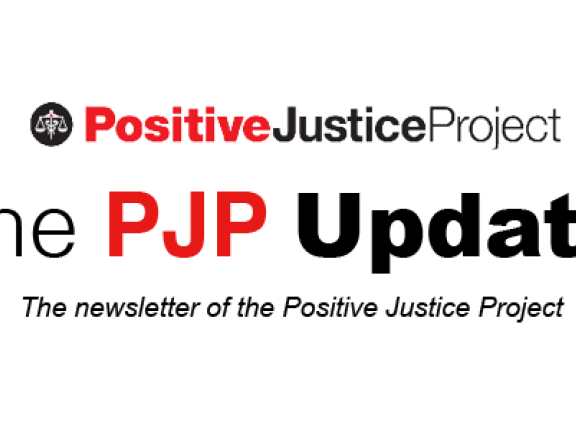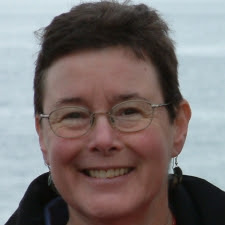Published September, 2021
The PJP Update, Positive Justice Project (September 2021)


CHLP and APA Host Prosecutors Roundtable in New York City

CHLP and the Association of Prosecuting Attorneys (APA) hosted a ground-breaking roundtable in June, attended by more than 30 New York City prosecutors and senior law enforcement professionals from all five NYC boroughs. Moderated by David LaBahn, President and Chief Executive Officer of the APA, the session focused on up-to-date information regarding the science of infectious disease as it relates to the work of prosecutors and law enforcement in New York City.
Dr. Benjamin Tsoi, the Director of HIV Prevention for the New York City Department of Health and Mental Hygiene’s Bureau of HIV, and Adrian Guzman, the Bureau of HIV’s Director of Policy and External Affairs, presented on the transmission and treatment of major infectious diseases, including HIV, hepatitis, and COVID, and their prevalence in New York City.
Creating opportunities for communication and collaboration between community organizations and law enforcement officials has been an important part of CHLP’s decriminalization agenda, and a focus of the Positive Justice Project. Prosecutors and police routinely deal with actual or perceived exposure to infectious diseases such as HIV and COVID, and so it is essential that the most accurate information about these diseases informs their responses.
CHLP joins NACDL Criminal Justice Network Conference on the Criminalization of Sex and HIV
 In August, CHLP’s Catherine Hanssens joined attorney Eric Paulk on a panel on the criminalization of sex, HIV, and identity featured at the National Association of Criminal Defense Lawyers’ (NACDL) annual national conference. Eric Paulk, Deputy Director of Georgia Equality and a member of the Georgia HIV Justice Coalition, shared insights from the long legislative battle advocates have waged to meaningfully reform Georgia’s laws that criminalize people living with HIV. With NACDL's Ivan Dominguez moderating, Catherine and Eric discussed the legacy of criminalizing sex, identity, and disease, and how the heavy burden of enforcement historically has fallen on Black people and sex workers.
In August, CHLP’s Catherine Hanssens joined attorney Eric Paulk on a panel on the criminalization of sex, HIV, and identity featured at the National Association of Criminal Defense Lawyers’ (NACDL) annual national conference. Eric Paulk, Deputy Director of Georgia Equality and a member of the Georgia HIV Justice Coalition, shared insights from the long legislative battle advocates have waged to meaningfully reform Georgia’s laws that criminalize people living with HIV. With NACDL's Ivan Dominguez moderating, Catherine and Eric discussed the legacy of criminalizing sex, identity, and disease, and how the heavy burden of enforcement historically has fallen on Black people and sex workers.
State and National Advocates Join Positive Justice Project Partners August Meeting
The PJP Partners August meeting welcomed national and state advocates who are actively engaged in challenging and reforming HIV criminalization laws across the country. Participants discussed their work over the past year, their plans for the future, and how advocates can work together to increase the power and visibility of as many state coalitions as possible.
The Partners envision this as the first in a series of meetings to strengthen our collaborative efforts. PJP Partners are organizations and individuals who participate in strategy discussions concerning the direction and resource needs of related decriminalization movements and work, and who collaborate on projects that advance the shared decriminalization goals of the Partners and their respective organizations. Partner organizations include the Association of Prosecuting Attorneys, The National Association of Criminal Defense Attorneys, The Williams Institute of UCLA Law School, the National Alliance of State and Territorial AIDS Directors, Women With a Vision, and individual activists and PLHIV from the Ohio Health Modernization Movement, the Nevada HIV Modernization Coalition/PozitivelyDee, and NJ Red Umbrella.
Letter to American Law Institute on Changes to Sex Offense Registry Provisions in Model Penal Code Authored by CHLP
 Over the summer, a letter was sent to the American Law Institute (ALI) asking their members to reconsider the release of a draft Model Penal Code (MPC) containing, for the first time, their recommended provisions for a sex offense registry. ALI's release of this draft MPC provision on a sex offense registry would set back current advocacy to end irrational sex offense laws and lists by effectively stating it is possible to "reform" the registry. This advocacy letter does not ask ALI to take any particular position; it asks them to NOT take a position that discourages a more comprehensive examination of the impact and harms of all aspects of the registry. The letter was drafted by Bill Dobbs, publisher of The Dobbs Wire, and CHLP's Executive Director Catherine Hanssens. It was endorsed by 50+ organizations and individuals and sent to ALI membership in advance of their meeting in early June 2021.
Over the summer, a letter was sent to the American Law Institute (ALI) asking their members to reconsider the release of a draft Model Penal Code (MPC) containing, for the first time, their recommended provisions for a sex offense registry. ALI's release of this draft MPC provision on a sex offense registry would set back current advocacy to end irrational sex offense laws and lists by effectively stating it is possible to "reform" the registry. This advocacy letter does not ask ALI to take any particular position; it asks them to NOT take a position that discourages a more comprehensive examination of the impact and harms of all aspects of the registry. The letter was drafted by Bill Dobbs, publisher of The Dobbs Wire, and CHLP's Executive Director Catherine Hanssens. It was endorsed by 50+ organizations and individuals and sent to ALI membership in advance of their meeting in early June 2021.
CHLP Flags Concerns Over the Effect of Molecular Surveillance on HIV Testing and Privacy
CHLP continues to outline unaddressed issues with the use of HIV molecular surveillance and the effect it has on HIV testing. A position statement adopted by AIDS United Public Policy Council (PPC) in June raises a core concern regarding the risks for PLHIV who may see HIV testing and related data used against them in criminal or immigration proceedings. Such issues can deepen the medical mistrust that alienates many whom our state and national Ending the Epidemic (ETE) strategies prioritize. The AIDS United PPC consists of more than 50 of the leading HIV-focused organizations from across the United States to advocate for people living with or affected by HIV and the organizations that serve them. CHLP’s Amir Sadeghi authored a related blog for National HIV Testing Day demanding accountability to PLHIV and the privacy, bodily autonomy, public health, and criminalization risks that underscore the PPC statement on molecular HIV surveillance.
CHLP Staff Remember Friend and Colleague Lauren Fanning

Lauren Fanning, former CHLP Senior Community Outreach Specialist for the Positive Justice Project and long-time HIV advocate from Washington state is remembered by her colleagues for being a dedicated, compassionate, and driven activist. Lauren died due to complications from cancer on September 16, 2021. For more, read CHLP Mourns the Loss of Advocate Lauren Fanning.
CHLP Presentations Focus on Viral Hepatitis and Breastfeeding at HINAC4
 CHLP staff members participated in the Virtual HIV is Not a Crime IV National Training Academy in June. Jada Hicks presented on the criminalization of viral hepatitis with Andrew Reynolds, the hepatitis C wellness manager at the San Francisco AIDS Foundation. Their panel inspired a subsequent interview with TheBodyPro. Catherine Hanssens joined the Well Project’s Olivia Ford and Cici Coven, and Heather O’Connor of ICW-NA (pictured) for a HINAC panel discussion on policies, laws, best practices and the lived experiences of parents living with HIV governing breastfeeding/chestfeeding. The panel was so popular at HINAC that it was reprised in an August webinar hosted by SERO. All of the panelists also are members of a newly formed Policy Action Group and already have collaborated on providing assistance to a pregnant woman whose physician has threatened to report her to state authorities if she follows through on her desire to breastfeed her newborn.
CHLP staff members participated in the Virtual HIV is Not a Crime IV National Training Academy in June. Jada Hicks presented on the criminalization of viral hepatitis with Andrew Reynolds, the hepatitis C wellness manager at the San Francisco AIDS Foundation. Their panel inspired a subsequent interview with TheBodyPro. Catherine Hanssens joined the Well Project’s Olivia Ford and Cici Coven, and Heather O’Connor of ICW-NA (pictured) for a HINAC panel discussion on policies, laws, best practices and the lived experiences of parents living with HIV governing breastfeeding/chestfeeding. The panel was so popular at HINAC that it was reprised in an August webinar hosted by SERO. All of the panelists also are members of a newly formed Policy Action Group and already have collaborated on providing assistance to a pregnant woman whose physician has threatened to report her to state authorities if she follows through on her desire to breastfeed her newborn.
CHLP in the News
- The Insider: R. Kelly case draws interest in laws that criminalize STIs. CHLP's Jada Hicks spoke with Insider.com about a case involving disgraced R&B artist R. Kelly, who is on trial for several crimes, including an allegation that he didn’t disclose a positive herpes diagnosis to sexual partners. Laws criminalizing STIs increase stigma and discrimination against people with communicable diseases, causing decreased willingness to cooperate with testing and treatment efforts.
- The Guardian: "Outrageous." Why was a US health worker charged with spreading Covid? CHLP's Anne Kelsey spoke to The Guardian about a case in New Jersey of Josefina Brito-Fernandez, a home health worker charged with inadvertently exposing an elderly patient to COVID-19. The charges against her are exceedingly harsh, especially when compared with the relative slap on the wrist given to a white gym owner who repeatedly and publicly subverted public health mandates. Brito-Fernandez faced five charges and had to give up her home health aid license to avoid prosecution.
- CNN Fact Check: Boebert falsely claims liberals have 'legalized' knowingly spreading HIV. This CNN article responds to false, stigmatizing claims about HIV criminal laws by a member of the U.S. House of Representatives with a fact-based accounting of how discriminatory, science-defying HIV criminal laws single out people living with HIV (PLHIV) for unfair treatment. As CHLP's Catherine Hanssens points out in the article, special laws specifically targeting PLHIV are not only destructive but completely unnecessary as anyone who acts with intent to harm another is already subject to prosecution under general criminal laws.

State Advocacy Working Group Updates
 Arkansas
Arkansas
CHLP’s Anne Kelsey presented during the Arkansas Department of Health’s HIV Planning Group Annual Retreat on meeting the sexual health care and literacy needs of youth in state custody. She discussed the overrepresentation of Black youth in Arkansas’ juvenile justice and foster care systems, the lack of sexual health care and education for these youth--including HIV testing and education--and relevant state laws and policies, as well as ways to move forward on the issue.
While not currently in legislative session, advocates from the Arkansas HIV Reform Initiative (AHRI) continue to meet and strategize around HIV criminal law reform, community education, and coalition-building. AHRI meetings are held on the second Thursday of the month at 11:00am (CT). To get involved, contact Latunja Sockwell at [email protected].

Georgia
At the close of the legislative session an HIV criminal law reform bill, Senate Bill 164, was unexpectedly revived as a House Substitute bill with an unrelated amendment. The new amendment would allow FDA-approved medications to be removed as Schedule I drugs. The original Senate sponsor, Senator Chuck Hufsteler, objected to the House Substitute bill with the new amendment, sending SB 164 back to the Senate Health and Human Services Committee to be heard again next year. Advocates will likely focus on removing the unrelated amendment and amending other provisions of SB 164, which makes several changes to the state’s HIV criminal law while retaining felony penalties.
The Georgia HIV Justice Coalition has prioritized a collaborative project to refine its guiding principles, vision statement, and membership intake process. Meetings are held on the third Wednesday of the month at 6:30pm (ET). To participate, contact Johnnie Kornegay at johnnie.kornegay@
 Illinois
Illinois
On June 27, Gov. J.B. Pritzker signed HB 1063 into law, repealing in its entirety Illinois’ HIV-specific criminal law. Senate Bill 655 was introduced by Illinois State Senator Robert Peters and passed the Illinois House of Representatives in April of this year and the Illinois Senate in May. The bill repeals the Illinois Criminal Transmission of HIV statute, removing any specific mention of HIV from the Illinois Criminal Code. While several states have updated their laws criminalizing PLHIV in recent years, Illinois is only the second to pass a repeal since Texas first did so in 1994. The law went into effect immediately. For more on the repeal, see Illinois Becomes Second State to Repeal HIV Criminalization Laws. For more on the Illinois HIV Action Alliance, visit their website
 Indiana
Indiana
After House Bill 1340 was signed into law by Governor Holcomb in April, Representative Ed Clere plans to submit a request to the Indiana Legislative Council for an interim study committee to further examine the HIV criminal laws in Indiana. To get involved in current and future advocacy with the Indiana HIV Modernization Movement, contact Carrie Foote at [email protected] or [email protected], or visit the coalition’s website.
 Louisiana
Louisiana
Earlier this year the Louisiana Coalition on Criminalization and Health (LCCH) joined other advocates and successfully defeated House Bill 238, a bill that would have increased the criminal penalties for exposure to sexually transmitted infections (STIs). The Louisiana Commission on HIV, AIDS, and Hepatitis C Education, Prevention, and Treatment circulated a statement to legislators earlier this year on the need for Louisiana’s HIV criminal statutes to be reformed. The Commission is also coordinating a fall summit with LCCH and stakeholders in the community, including criminal justice professionals, media and public health experts, and PLHIV. LCCH meets on the second Wednesday of the month. If you are interested in working with the coalition, contact [email protected].
 Missouri
Missouri
Senate Bill 53, sponsored by Senator Tony Luetkemeyer, was signed into law by Governor Mike Parson on July 14. The omnibus crime bill included some minor changes to state laws that criminalize PLHIV. While the law reduces minimum sentences for PLHIV who knowingly expose another to HIV, it retains harsh felony-level punishments for exposure even without proof of intent to transmit, let alone transmission. Because of the retained felony penalties, the broadening of the laws from criminalizing only HIV to now criminalizing “a serious infectious or communicable disease” requiring life-long treatment expands the scope of health issues that now can lead to felony convictions in Missouri. The law also leaves in place a significant sentence enhancement for sex workers living with HIV. For more, see HIV Criminal Law Reform in Missouri Retains Felony Punishments for Exposure and Continues to Target Sex Workers and Incarcerated PLHIV. The Missouri HIV Justice Coalition is currently in recess, but coalition member Devin Hursey recently shared his thoughts on the new law in The Body. Meetings are held on the second Friday of the month at 1:00pm (CT). For more information, email mohivjustice@empowermissouri.
 Nevada
Nevada
On June 6, Governor Steve Sisolak signed Senate Bill 275 into law. The bill was introduced by Senator Dallas Harris. SB 275 repealed NRS 201.205, an HIV-specific criminal offense carrying a penalty of up to 10 years in prison, replacing it with a misdemeanor offense in the public health code. Led by local advocacy groups, the reform process produced a major reworking of both criminal and public health codes that take into account modern concepts of individual liberty and racial, gender, and disability justice. For more information on the bill, see Nevada Passes Law Reforming HIV Criminal Laws. The Nevada HIV Modernization Coalition meets on the first Tuesday of the month at 5:30pm (PT). To get involved, contact co-chair Connie Shearer at [email protected].
 New Jersey
New Jersey
Senate Bill 3707 is waiting to be heard in the Senate Budget and Appropriations Committee after passing the Health, Human Services and Senior Citizens Committee in May. The bill was introduced by New Jersey State Senator Joseph Vitale. SB 3703 would amend state law criminalizing exposure to sexually transmitted infections (STIs), including HIV. Currently, it is a crime of the fourth degree if a person knows they are living with an STI and exposes someone through sexual contact without first disclosing their status. For PLHIV, the same offense is a crime of the third degree (equivalent to a felony). For more information, contact Amir Sadeghi at [email protected].
 New York
New York
CHLP continues to play an active role in the COVID-19 Working Group-NYC and its work to ensure that New York’s response to the pandemic is community-oriented and meets the needs of underserved communities. CHLP's Anne Kelsey recently gave the opening remarks during a Covid Justice Coalition webinar about the effects of the COVID-19 pandemic on the criminal legal system.
 Ohio
Ohio
The Ohio Health Modernization Movement (OHMM) is actively promoting the HIV criminal reform legislation that they have refined over the last few months. They hope to see the legislation introduced this year. OHMM meetings are held every other third Monday of the month at 6:00pm (ET). For more information, contact [email protected].
 Southern States
Southern States
The Southern HIV Decriminalization Network shares information and ideas about the work of state groups in the South to reform their laws and reports on case developments of interest to the group. Calls are held on the fourth Thursday of the month at 3:00pm (ET). To join, contact Charles Stephens at charles.stephens@
 Tennessee
Tennessee
The Tennessee HIV Modernization Coalition is planning its first Virtual HIV Modernization Town Hall meeting, scheduled for Tuesday, September 28 at 6:00pm (CT). For more information, contact Robin Lennon-Dearing at [email protected].
 Virginia
Virginia
ECHO VA (Ending Criminalization of HIV and Over-incarceration in Virginia) meets every month. To participate, email [email protected].
 Washington
Washington
Following reform of Washington’s HIV criminal law in 2020, the Washington HIV Justice Alliance (WHJA) continues to monitor the Board of Health’s ongoing rulemaking process and provide community input. CHLP is working with the National Association of Criminal Defense Attorneys (NACDL) to assist persons convicted under the former law who remain on the sex offender registry. For more on the reform, see HIV Criminal Law Reform, Before and After: Washington. WHJA meets every other Monday at 11:00am (PT). To get involved, contact Erick Seelbach at [email protected].

CHLP’s assistance in criminal cases includes counseling defendants and their families, providing legal and trial strategy support to criminal defense attorneys, identifying and assisting with the preparation of medical and scientific experts, drafting sections of court submissions, and submitting friend-of-the-court briefs.
 Montana
Montana
Earlier this year, a Montana federal district court determined that Montana violated both the state and United States Constitutions when it required sex offense registration for Randall Menges, who was convicted (when he was 18) of “crimes against nature” for having consensual sex with another young man in 1993. Montana’s Attorney General appealed the ruling to the 9th Circuit Court of Appeals. CHLP’s Catherine Hanssens is coordinating with lawyers from the Montana ACLU and Lambda Legal on an amicus brief in support of Menges. The brief, which will address the history of homophobia baked into assessments of sexually active gay men as sex offenders, will be filed later this year.
 New York
New York
A hearing appealing the indefinite civil confinement of Nushawn Williams was held in July. The judge then ruled that Williams should remain in detention. Despite serving 12 years for charges of reckless endangerment and statutory rape, Williams has been held at the Central New York Psychiatric Center for an additional 10 years. During his civil commitment hearing, the Attorney General and their experts referred to Williams' HIV status more than 1,000 times in describing his "dangerousness." For more information on community-led efforts to advocate for Williams’ release, email Davina Otalor at [email protected] or visit FreeNushawn.com.
 Virginia
Virginia
The Supreme Court of Virginia has agreed to hear an appeal of the civil commitment of Galen Baughman. Baughman’s attorneys filed their brief with the Supreme Court of Virginia on August 11. Baughman is a gay man and advocate who was civilly committed and then placed on indefinite intensive supervision due to a finding that he is a “sexually violent predator” likely to commit a violent sex offense in the future. CHLP’s friend-of-the-court brief in support of Baughman’s petition for appeal will be included in the record before the court. For more information, see CHLP Brief Calls out Homophobic Bias in Case of Gay Man Unjustly Designated a “Sexually Violent Predator”.
If you are aware of anyone charged in an HIV exposure or transmission case, please refer them or their lawyer to CHLP for assistance at 212-430-6733 or [email protected].
Copyright Information: CHLP encourages the broad use and sharing of resources. Please credit CHLP when using these materials or their content. and do not alter, adapt or present as your work without prior permission from CHLP.
Legal Disclaimer: CHLP makes an effort to ensure legal information is correct and current, but the law is regularly changing, and the accuracy of the information provided cannot be guaranteed. The legal information in a given resource may not be applicable to all situations and is not—and should not be relied upon—as a substitute for legal advice.